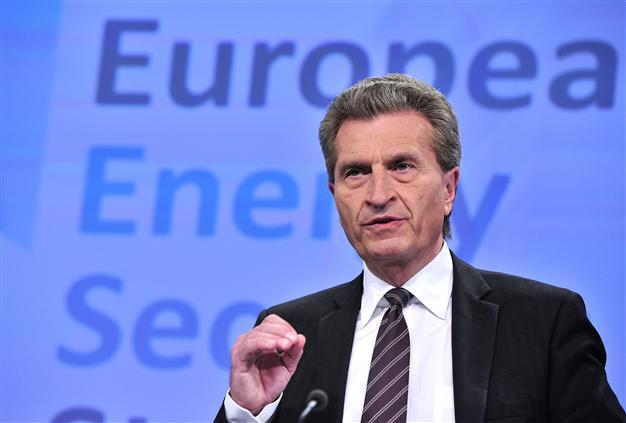UK to try ‘shale option’ to escape high renewable energy costs
ANKARA – Anadolu Agency

EU commissioner for Energy Günther Oettinger gives a press conference on May 28 , 2014 at the EU Headquarters in Brussels. AFP Photo
Experts have said the U.K. may take a step toward hydraulic fracking to extract shale gas, given the high economic cost of subsidizing renewable energy, as the new Cabinet also signals such a tendency.
The U.K.’s new energy and environment ministers have bluntly said they oppose renewable energy and favor hydraulic fracking for extracting shale gas instead.
On July 4, EU Energy Commissioner Günther Oettinger called on Germany to lift the ban on fracking, triggering fresh debates on whether the EU will see shale gas as an alternative to Russian gas to curb its dependence.
London-based Global Resources Corporation President Mehmet Öğütçü said it is the high economic cost of renewable energy that distances European countries from the move.
In the U.K., particularly the operation of offshore wind farms is too costly and consequently, they are considering fracking, he added.
Cüneyt Kazokoğlu of Facts Global Energy (FGE), another London-based agency, told Anadolu Agency that it does not necessarily mean that a European policy will follow the British ministers’ view.
However, he explained the change in the U.K. and said, “The new cabinet is more inclined to the right.
Energy Minister Matthew Hancock is especially against the subsidies given to wind farms and the new Environment Minister Elizabeth Truss, who is a former Shell employee, is pro-nuclear, fossil fuels and fracking.”
The U.K.’s National Audit Office’s June report says the country gave 16.6 billion pounds’ worth of subsidies for five offshore wind farms and three biomass plants, which are to become operational between 2015 and 2019.
The National Grid’s July 2014 report suggests the current wholesale electric price is below 50-pound per megawatt per hour, but could soar to over 100 pounds by 2035. It also says since 2009, electricity prices have surged by 20 percent – the main reason being the subsidies given to wind farms.
Kazokoğlu said the reason behind Oettinger’s positive position on fracking was also because of his political standing coming from the Christian Democratic Union (CDU) led by Angela Merkel. The CDU believe in creating an EU-wide energy internal market and favor the EU’s Energy 2020 Strategy for competitive, sustainable and secure energy. They believe the current carbon scheme must be overhauled with new policies.
Kazokoğlu stated the general atmosphere in the EU is not supportive to fracking activities, and said, “The new EU commissioner Jean-Claude Juncker is also against fracking. To illustrate, Germany’s shale potential is only sufficient for 10 years of consumption. Therefore, the U.K. can take a step toward hydraulic fracking for shale gas, but it will be limited to the U.K. only and will not be extended EU-wide.”
